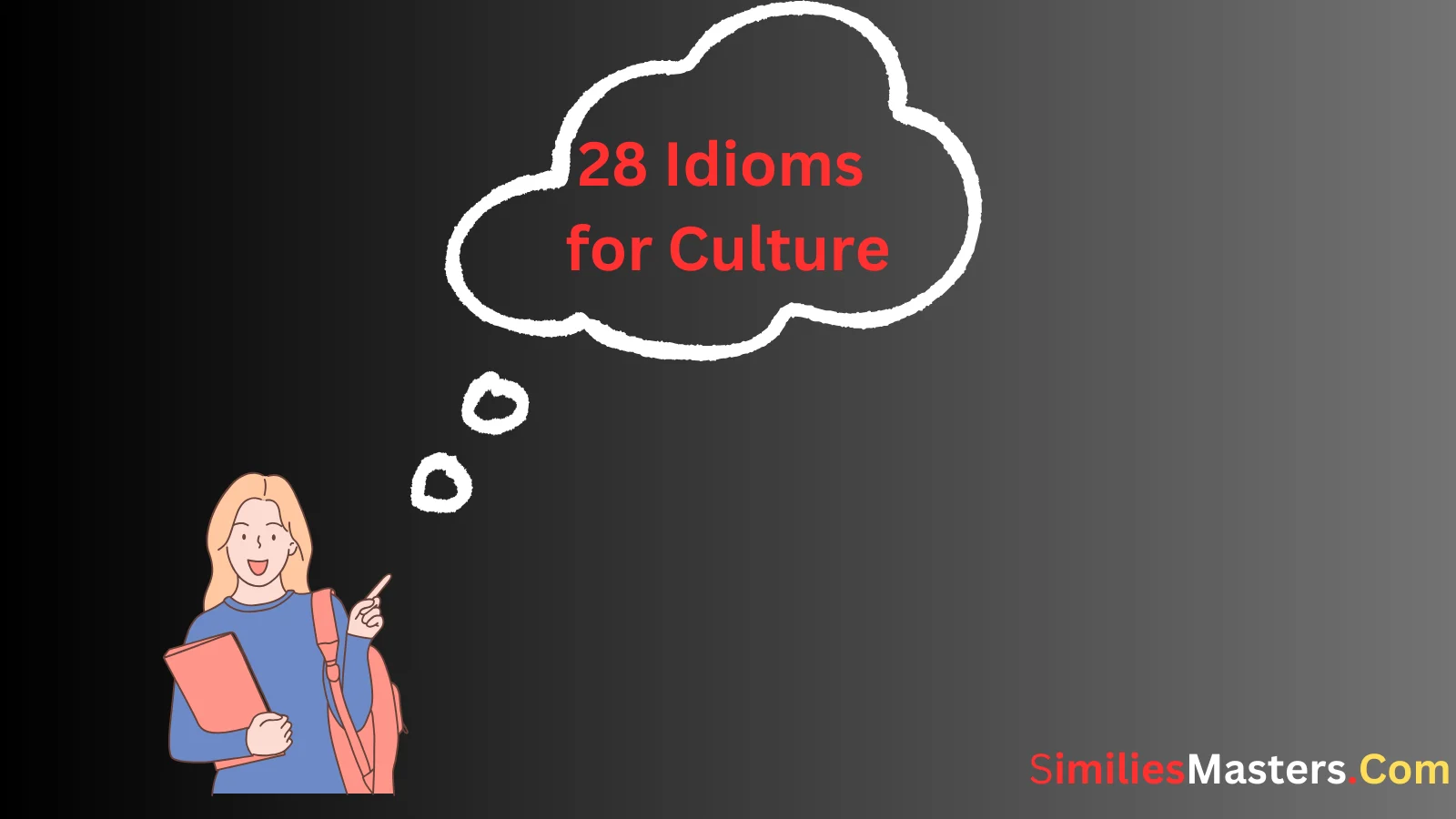Culture shapes the way we think, speak, and act. These idioms reflect traditions, values, and customs that influence societies across the world.
1. When in Rome, Do as the Romans Do
Meaning: Adapt to the customs of the place you’re in.
Example: “I wasn’t used to eating with chopsticks, but when in Rome, do as the Romans do.”
Tone: Practical, respectful.
Other ways to say it: Blend in, follow local customs.
2. A Melting Pot
Meaning: A place where different cultures mix.
Example: “New York City is a true melting pot of cultures.”
Tone: Inclusive, diverse.
Other ways to say it: Cultural hub, diverse community.
3. Cultural Mosaic
Meaning: A society where different cultures coexist without blending.
Example: “Canada is known as a cultural mosaic rather than a melting pot.”
Tone: Appreciative, observant.
Other ways to say it: Diverse society, multicultural blend.
4. Lost in Translation
Meaning: When meaning is misunderstood due to cultural or language differences.
Example: “His joke was lost in translation, and no one laughed.”
Tone: Confused, humorous.
Other ways to say it: Misinterpreted, misunderstood.
5. Speak the Same Language
Meaning: To have similar values or understanding.
Example: “Despite their differences, they spoke the same language in business.”
Tone: Cooperative, understanding.
Other ways to say it: On the same page, in sync.
6. A Different Kettle of Fish
Meaning: A completely different situation or culture.
Example: “Moving from a small town to a big city is a different kettle of fish.”
Tone: Comparative, eye-opening.
Other ways to say it: A whole new world, something entirely different.
7. A Fish Out of Water
Meaning: Feeling out of place in a new culture.
Example: “I felt like a fish out of water at the traditional ceremony.”
Tone: Uncomfortable, unfamiliar.
Other ways to say it: Out of place, unfamiliar territory.
8. Break Bread with Someone
Meaning: To share a meal and connect culturally.
Example: “We broke bread with our new neighbors to welcome them.”
Tone: Friendly, communal.
Other ways to say it: Share a meal, bond over food.
9. Old Habits Die Hard
Meaning: Cultural traditions are difficult to change.
Example: “Even after moving abroad, she still follows her home traditions—old habits die hard.”
Tone: Traditional, reflective.
Other ways to say it: Hard to change, deeply rooted.
10. Keep the Tradition Alive
Meaning: Preserve cultural customs over time.
Example: “Our family keeps the tradition alive by celebrating our ancestors.”
Tone: Proud, appreciative.
Other ways to say it: Maintain culture, pass it down.
11. Learn the Ropes
Meaning: Understand cultural customs or practices.
Example: “It took me a while to learn the ropes of business etiquette in Japan.”
Tone: Educational, adaptive.
Other ways to say it: Get the hang of it, adjust to culture.
12. A Hard Nut to Crack
Meaning: A complex culture or tradition to understand.
Example: “The history of this country is a hard nut to crack.”
Tone: Challenging, deep.
Other ways to say it: Difficult to grasp, not easy to understand.
13. The Best of Both Worlds
Meaning: Enjoying advantages from two different cultures.
Example: “Being bilingual gives me the best of both worlds.”
Tone: Positive, beneficial.
Other ways to say it: Enjoying diversity, dual benefits.
14. Old School
Meaning: Sticking to traditional cultural values.
Example: “My grandmother is very old school about gender roles.”
Tone: Traditional, sometimes outdated.
Other ways to say it: Conservative, classic mindset.
15. New Blood
Meaning: New cultural influences or ideas.
Example: “The younger generation is bringing new blood to our traditions.”
Tone: Refreshing, innovative.
Other ways to say it: Fresh perspective, modern influence.
16. Born and Bred
Meaning: Raised within a specific culture.
Example: “He’s a New Yorker, born and bred.”
Tone: Rooted, proud.
Other ways to say it: Native, deeply connected.
17. Stick to Your Roots
Meaning: Stay connected to one’s cultural background.
Example: “Even after moving abroad, she sticks to her roots.”
Tone: Loyal, sentimental.
Other ways to say it: Stay true to heritage, hold on to traditions.
18. The Ties That Bind
Meaning: Cultural or family connections that keep people together.
Example: “Despite living far apart, the ties that bind keep our family close.”
Tone: Sentimental, strong.
Other ways to say it: Unbreakable bond, family connection.
19. Old Wine in a New Bottle
Meaning: Presenting an old tradition in a modern way.
Example: “Their wedding blended modern trends with traditional rituals—it was old wine in a new bottle.”
Tone: Innovative, respectful.
Other ways to say it: Tradition with a twist, modernized customs.
20. Go Native
Meaning: Adopt local cultural customs.
Example: “After years in Thailand, he completely went native, even speaking the language fluently.”
Tone: Immersive, adaptive.
Other ways to say it: Blend in, embrace the culture.
21. Know Where You Come From
Meaning: Understand and respect your cultural heritage.
Example: “No matter where you live, it’s important to know where you come from.”
Tone: Proud, grounding.
Other ways to say it: Stay connected to roots, remember your heritage.
22. Cultural Shock
Meaning: The feeling of surprise in a new culture.
Example: “Moving from a small town to a bustling city gave me major culture shock.”
Tone: Overwhelming, eye-opening.
Other ways to say it: Feeling out of place, adjusting to new norms.
23. The Elephant in the Room
Meaning: A big cultural issue that people avoid discussing.
Example: “The debate on immigration is the elephant in the room in politics.”
Tone: Uncomfortable, controversial.
Other ways to say it: Unspoken issue, taboo topic.
24. East Meets West
Meaning: The blending of different cultures.
Example: “Her wedding was a perfect example of East meets West, with both traditions honored.”
Tone: Harmonious, global.
Other ways to say it: Cultural fusion, global mix.
25. The Way of the World
Meaning: How cultures naturally evolve over time.
Example: “Traditions change—it’s just the way of the world.”
Tone: Philosophical, accepting.
Other ways to say it: Natural evolution, inevitable change.
26. Cultural Capital
Meaning: Knowledge and understanding of culture as an asset.
Example: “Speaking multiple languages gives you cultural capital in global business.”
Tone: Educational, intellectual.
Other ways to say it: Cultural advantage, knowledge power.
27. A Thing of the Past
Meaning: A tradition or practice that is no longer relevant.
Example: “Some old customs are now a thing of the past.”
Tone: Observational, reflective.
Other ways to say it: Outdated, no longer practiced.
28. Walk a Mile in Someone’s Shoes
Meaning: Understand a culture by experiencing it.
Example: “Before judging, walk a mile in their shoes and see how they live.”
Tone: Empathetic, open-minded.
Other ways to say it: See from their perspective, understand deeply.
Conclusion
Culture is rich with traditions, values, and expressions. These idioms reflect how we navigate, honor, and adapt to cultural influences in our lives.



